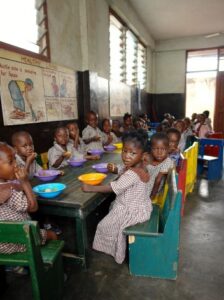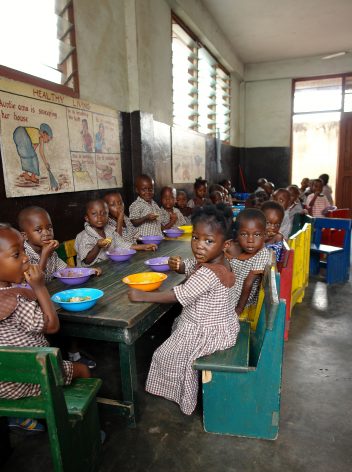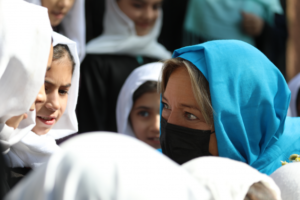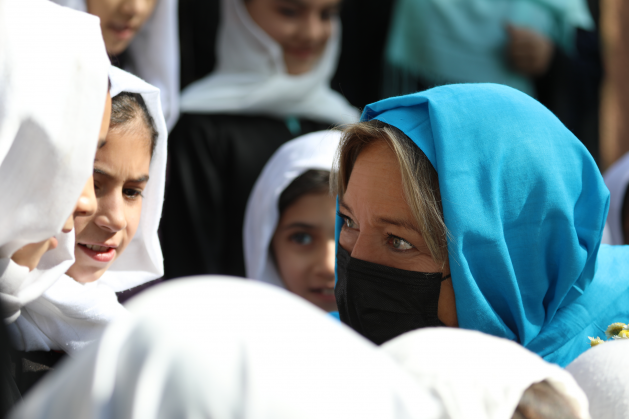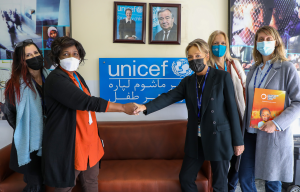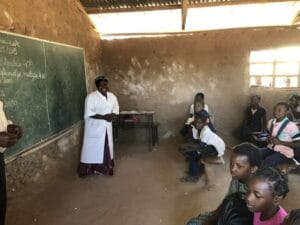
Civil Society, Climate Change, Climate Change Justice, COP28, Development & Aid, Editors’ Choice, Education, Environment, Featured, Humanitarian Emergencies, Poverty & SDGs, Sustainable Development Goals
Education Cannot Wait. Future of Education is here

Teacher Maria Alberto in her classroom, 3500 classrooms were destroyed by Cyclone Idai in Mozambique. Credit: Manan Kotak/ECW
– A catastrophic surge in the frequency, intensity, and severity of extreme weather events has placed children on the frontlines of climate emergencies. Nearly half of the world’s children, or one billion, live in countries at extremely high risk from the effects of the climate crisis. Most of these children face multiple vulnerabilities.
An estimated 80 percent of countries categorized as extremely high-risk are also categorized as Least Developed Countries (LDCs). More than 62 million children—nearly one-third of the 224 million crisis-affected children worldwide in need of educational support—face the repercussions of climate-related events like floods, storms, droughts, and cyclones, which are further intensified by climate change.
Against this backdrop and in advance of the Conference of the Parties (COP28) in Dubai, United Arab Emirates, the United Nations global fund for education in emergencies and protracted crises, Education Cannot Wait (ECW), issued today an urgent appeal for USD 150 million in new funding to respond to the climate crisis.
“The very future of humanity is at stake. Rising seas, spiking temperatures, and ever-more-severe droughts, floods, and natural hazards are derailing development gains and ripping our world apart. As we’ve seen with the floods in Pakistan and the drought in the Horn of Africa and the Sahel, climate change is triggering concerning jumps in forced displacement, violence, food insecurity, and economic uncertainty the world over,” said Yasmine Sherif, Executive Director of Education Cannot Wait.
The new appeal underscores the urgent need to connect education action with climate action. New ECW data indicates that 62 million children and adolescents affected by climate shocks have been in desperate need of education support since 2020. This appeal was prepared in November 2023 by the ECW Secretariat based on estimates provided in the organization’s background study, “Futures at Risk: Climate-Induced Shocks and Their Toll on Education for Crisis-Affected Children.
[embedded content]
The study draws on the latest ECW global update’s findings and methodology, as well as the latest research, and endeavors to bridge critical knowledge gaps with regard to the extent to which climate change, environmental degradation, and biodiversity loss impact and displace school-aged children globally and influence access to education.
Study findings show that over the last five years, more than 91 million school-aged children impacted by crises have faced climate shocks amplified by climate change. The effects have been particularly pronounced in Sub-Saharan Africa, affecting 42 million children, and in South Asia, impacting 31 million children. Among the various climate hazards assessed, droughts emerge as the most severe and persistent, disproportionately affecting children in Sub-Saharan Africa.
“The climate crisis is robbing millions of vulnerable girls and boys of their right to learn, their right to play, and their right to feel safe and secure. In the eye of the storm, we urge new and existing public and private sector donors to stand with them. We appeal to you to act right here, right now, to address the climate and education crisis,” said Gordon Brown, UN Special Envoy for Global Education and Chair of the ECW High-Level Steering Group.
Additionally, the Futures at Risk study stresses that children affected by climate hazards are at risk of educational disruptions due to forced displacement. In the 27 crisis-affected countries where 62 million children have been exposed to climate shocks since 2020, there were 13 million forced movements of school-aged children due to floods, droughts, and storms.
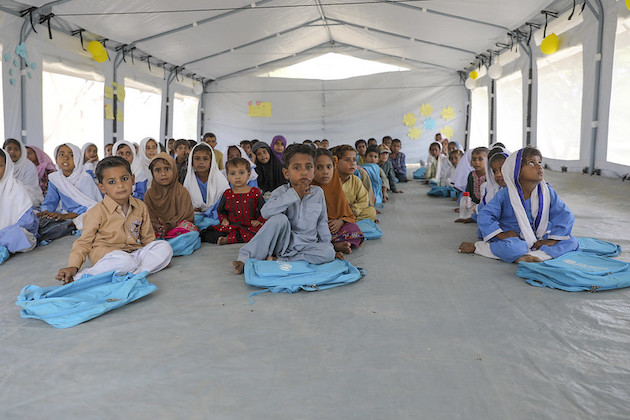
Young girls and boys, after receiving UNICEF bags and books, attended their first class in a UNICEF-supported temporary learning centre in Allah Dina Channa village, district Lasbela, Baluchistan province, Pakistan. The primary school was badly damaged during a heavy monsoon rain in 2022. Credit: UNICEF
The 224 million school-aged children globally effected by crises need diverse forms of educational support. Of these, 31 million children are in countries ill-prepared to handle the impacts of severe climate-related crises. Droughts, closely followed by floods, are the most frequently encountered climate-related shocks, which often intertwine and exacerbate one another.
“Education is an essential component in delivering on the promises and commitments outlined in the Paris Agreement, the Sendai Framework for Disaster Risk Reduction, and the Sustainable Development Goals. As all eyes turn toward this year’s Climate Talks (COP28) and the Global Refugee Forum, world leaders must connect climate action with education action,” Sherif emphasizes.
The number of disasters driven, in part, by climate change has increased fivefold in the past 50 years. By 2050, climate impacts could cost the world economy USD 7.9 trillion and could force up to 216 million people to move within their own countries, according to the World Bank. This poses a real and present threat to global security, economic prosperity, and efforts to address the life-threatening impacts of the climate crisis.
Unmitigated, the study shows that the future of millions of children is at risk. Children who are already at risk of dropping out face an even higher risk when exposed to crises worsened by climate change and environmental degradation. In Sub-Saharan Africa, where climate-related crises are prevalent, internally displaced children are 1.7 times more likely to be out of primary school compared to their non-displaced peers.
The study emphasizes that climate change impacts are not gender-neutral. Women and girls are disproportionally affected due to preexisting gender norms. Climate change exacerbates the risks of gender-based violence, school dropouts, food insecurity, and child marriage.
The new appeal outlines a strategic value proposition that connects donors, the private sector, governments, and other key stakeholders to create a coordinated approach to scaling up education funding in response to the climate crisis. The new funding aims to ensure learning continuity by providing mental health and psychosocial support, school rehabilitation and resilience, child protection, gender-based violence prevention and risk mitigation, water, sanitation, and hygiene (WASH), disaster risk reduction, and anticipatory and early action measures.
ECW has championed the right to education for children affected by the global climate crisis. In the aftermath of devasting floods, Libya, Mozambique and Pakistan and spikes in hunger, forced displacement, and violence across the Horn of Africa and the Sahel, the ECW has issued emergency grants to get children and adolescents back to the safety and opportunity that quality education provides.
Within existing programmes in crisis-impacted countries like Bangladesh, Chad, Nigeria, South Sudan and Syria, ECW investments are supporting climate-resilient infrastructure, disaster risk reduction, and school meals, offering hope and opportunity in the most challenging circumstances.
IPS UN Bureau Report

